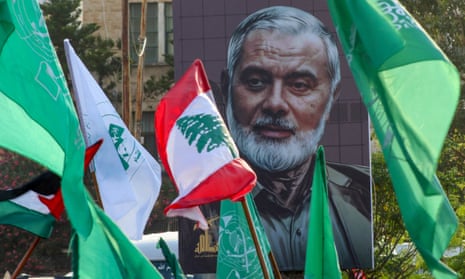The deadly attack on Ismail Haniyeh in Tehran raised the possibility of escalating regional tensions and sabotaging efforts to broker a cease-fire in Gaza.protesting the murder of Hamas leader Ismail Haniyeh in Tehran on Wednesday by waving Palestinian flags and shouting “death to Israel.”
The Middle East was shaken by the predawn death of a senior Hamas leader in Tehran on Wednesday, which sparked threats of retaliation from Iran’s authorities and threatened to sabotage delicate talks for a cease-fire in Gaza.
Ismail Haniyeh, 62, the leader of Hamas, was a key negotiator in the cease-fire talks and oversaw the militant organization’s political office in Qatar. He was assassinated after attending the inauguration of Iran’s new president among other leaders of militant groups backed by Iran.

Israeli officials refused to say if their nation was responsible for the egregious breach of Iran’s defenses. However, Hamas officials and Iranian authorities swiftly laid the blame on Israel and pledged to exact revenge for Mr. Haniyeh’s passing, escalating concerns about a wider regional conflict.
Three Iranian officials briefed on the matter said that Iran’s supreme leader, Ayatollah Ali Khamenei, gave the order for Iran to launch a direct strike against Israel.
A day after taking the oath of office with Mr. Haniyeh seated in the front row, Masoud Pezeshkian, the new president of Iran, declared in a statement on Wednesday that “we will make the occupying terrorist regime regret its action.” Iran is determined to protect its honor, dignity, reputation, and sovereignty.
Israel has rattled Iran’s authorities with a series of high-profile assassinations in recent years. Israel’s prime minister, Benjamin Netanyahu, informed reporters in November that he had given the foreign intelligence agency, Mossad, instructions to “act against the heads of Hamas, wherever they are.”

Israeli fighter aircraft carried out a separate operation in the southern suburbs of Beirut, the capital of Lebanon, hours before Mr. Haniyeh was assassinated in the Iranian capital. In this operation, they killed Fuad Shukr, a senior member of Hezbollah, the Lebanese group that shares Iranian support with Hamas. Since October, Hezbollah and Israel have been engaged in a low-level conflict over Hamas’s leadership of a deadly rampage through southern Israel, which set off the Gaza War.
On Wednesday, Hezbollah declared that Mr. Shukr had perished in the Israeli attack on a structure in a heavily populated area of Beirut. Mr. Haniyeh was staying in a hotel run by the Iranian Revolutionary Guard Corps in Tehran when he was killed in an explosion.
After Israel and Hamas appeared to be moving toward a cease-fire in Gaza, where tens of thousands of people have died during nearly ten months of fighting, the two attacks changed the dynamics in the Middle East. In order to help Hamas, the negotiators had anticipated that a compromise would also result in a cease-fire between Israel and Hezbollah, which had started firing into northern Israel.

The Biden administration thought it was “too soon to know” what impact the assassination may have on talks over a cease-fire and the release of hostages, according to John F. Kirby, a spokesman for White House national security. He stated that the US remained in contact with representatives from Qatar and Egypt who had been serving as negotiators in the negotiations.
The focus now is on Iran’s response to a strike inside its borders, how Hamas and Hezbollah will respond to assaults on their leaders, and whether either response could spark a wider conflict.
According to Al-Aqsa TV, a channel controlled by Hamas, Mousa Abu Marzouk, a member of Hamas’s political bureau, declared that the organization would exact revenge on Israel, calling Mr. Haniyeh’s death “a cowardly act and will not go unpunished.”













